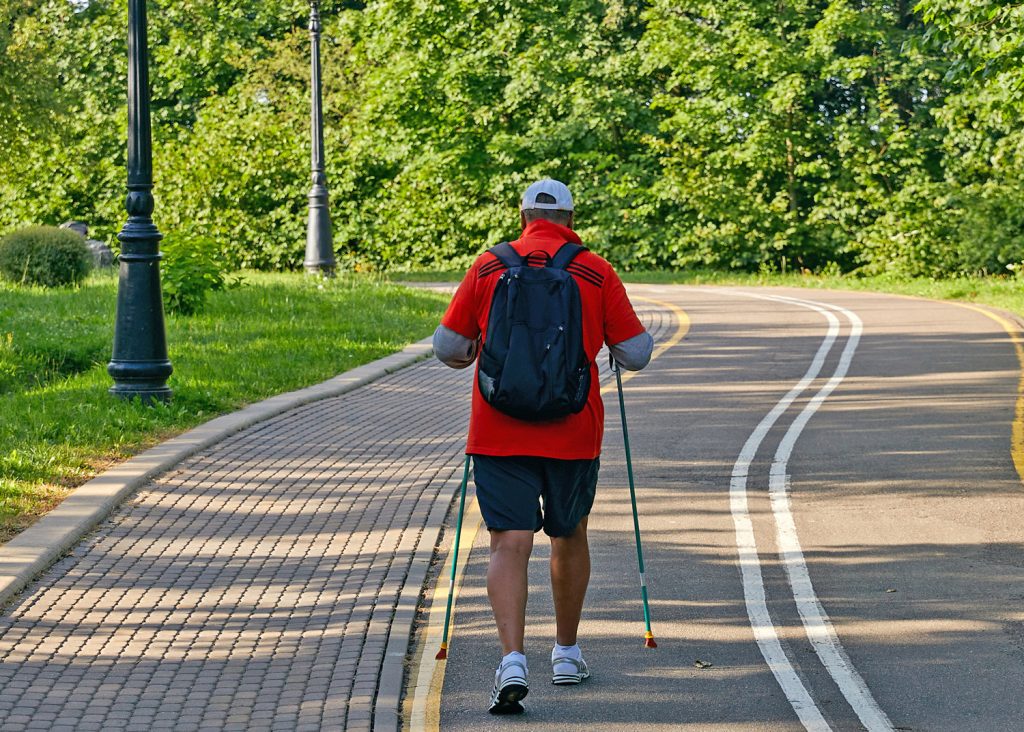Calories Burned Hiking Calculator
:
Hiking HoursCalories Burned
Distance Covered
Hiking Pace
Hiking Duration

Benefits of hiking
Hiking is a great way to explore nature, get some fresh air, and enjoy everything the earth has to offer. Not only that, but hiking is a great form of exercise and physical activity.
Hiking promotes good health and fitness in a variety of ways, including:
- Building up bone density
- Strengthening your muscles, such as your glutes, hamstrings, and quadriceps
- Improving core strength
- Maintaining and losing weight
- Bettering your balance
- Lowering your risk for certain chronic conditions such as heart disease, blood pressure, and blood sugar levels
In addition to the physical benefits of hiking, there are also many mental health advantages. These include, but are not limited to:
- Reducing stress and calming anxiety
- Lowering the risk of depression
- Improving sensory perception
Outside of these benefits, hiking can also:
- Provide social interaction if hiking with a buddy
- Improve self esteem
- Help you unplug from technology (1)
Why should you use a hiking calculator?
Now that you are ready to go on a hike, it is a good idea to determine how to meet your fitness goals while doing so. Hiking is a great form of exercise and an excellent way to burn calories. In order to sustain physical capacity and control energy expenditure, it is important that you track your calories burned. These calculations will help you to track progress and provide your body with enough fuel.
Knowing your caloric expenditure can aid in optimizing your backpack weight by only including the food and water you need. Additionally, there are a number of different variables at play when hiking and burning calories. Using our calculator can help you adjust certain aspects of your hike to achieve your desired fitness goals.
Calculating your calories burned can be tricky as there are various factors to consider. This calculator aims to simplify the variables and the math. After entering just a few numbers and checking a few boxes, you can have a strong estimate of your calorie expenditure during a hike.
How to use our calculator
Using our calculator to determine your calories burned while hiking is relatively easy. Just input some personal information and hike-specific factors to generate a calories burned estimate. The list below includes step-by-step instructions on how to plug in your information.
Step 1: Select your desired unit of measurement. Imperial refers to measurements described as pounds, hours, and minutes. Metric refers to measurements described as kilograms, hours, and minutes.
Step 2: Enter your weight in the unit of measurement selected above.
Step 3: Enter the weight of your backpack. If you are not carrying anything, enter the number “0”.
Step 4: Enter the distance you traveled or plan to travel.
Step 5: Enter in the number of hours that you hiked or plan to hike. If you are hiking for less than one hour enter the number “0”.
Step 6: Enter in the number of minutes that you hiked or plan to hike after the final hour mark. For example, if you are hiking for two hours and 46 minutes, enter in the number “46”.
Step 7: Pick the type of hike you are doing. If you are calculating for an uphill or downhill hike, select the estimated incline level of your route.
Step 8: Click “Calculate”.
Understanding the results
After inputting your information, our calculator will provide you with the number of calories that you burned or will burn doing that hike you described. Happy with your results? That’s great! If you would like to burn more calories than what was outputted from the calculator, try adjusting certain aspects. For example, you could increase the distance or time spent hiking to increase the number of calories that you would burn. Playing around with the calculator can help you to tailor your hiking plan to match your fitness goals.
Explaining related information
Now that you know how many calories you may burn during a hike, it is important to understand how certain parts of your hike can increase or decrease your caloric expenditure. Knowing these details can help you to adjust your hike to reach your fitness goals or sustain your energy. We outline below how certain hike factors can influence your burn rate.
Body Weight
Weight is a critical factor to consider when estimating how many calories you burn during a hike. The general rule of thumb for body weight indicates that the heavier you are, the more calories that you burn. For example, take two men that both hike the same five-mile trail. One is 190 pounds and one is 150 pounds. The individual who weighs 190 pounds will burn more calories than the individual who weighs 150 pounds.
Why does this happen? Well a calorie is a measurement of how much energy we use. Someone who weighs 190 pounds is going to require more energy to make the same bodily movement as someone who weighs 150 pounds. Think of it like a car; a larger car typically guzzles up more gas than a smaller car. This is because heavier and larger cars require more fuel to move the same distance as a smaller car (2).
Backpack Weight
Just like your own body weight matters, so does the weight of your luggage. The more your backpack weighs, the more calories you will expend. Having a lighter load will burn an estimated 50 calories more each hour you hike. A larger load for a longer trip will burn an estimated 100 calories or more each hour you hike. For example, a 170-pound male will burn more calories hiking the same trail when carrying a 30-pound backpack compared to a 15-pound backpack.
Distance
Perhaps the most obvious factor in determining your energy expenditure is how far you walk. When hiking the same trail at the same pace, walking the trail for longer will burn more calories.
Hiking Pace
Your pace is another important factor in determining how many calories you burn on a hike. Not only does it affect how fast you complete your hike, but it also influences the number of calories you will burn. The quicker you hike, the more calories you will expend. The typical individual will burn roughly 300 calories each hour while walking at a medium pace of three miles each hour. If the same individual increases their pace to four miles per hour, they can burn an additional 100 calories (3).
Incline
Hiking up a greater incline will require you to expend more energy. In fact, increasing your incline to 10% will double your average burned calories per hour. Increasing your incline to 20% will triple your average burned calories per hour. This is because you are utilizing different muscles to maintain your walk uphill as opposed to walking on a flat surface. Additionally, your body is working harder against the pull of gravity. Hiking at an incline is an example of a more vigorous exercise and can consequently increase your heart rate and burn more calories. For example, an individual who is 150 pounds will burn 80 calories for each mile walking on flat terrain. When they start walking uphill, they can burn almost an additional 50 calories per mile (4).
Frequently Asked Questions (FAQs)
How does hiking compare to other exercises, such as cardio?
Hiking is actually considered a form of cardio, as it aids in building endurance and strength. Running will increase your heart rate more and potentially burn more calories compared to a hike. However, the difference is not large. For example, someone may run for an hour at a rate of five miles per hour and burn 700 calories. If the same person were to hike cross country for the same amount of time, they would burn roughly 525 calories (5).
How do I replenish the calories burned while hiking?
It is important to pack enough fuel to compensate for the calories that you are burning during a long hike. Adequate fuel will help you to maintain your energy levels and physical capacity to continue hiking. Focus on eating calorie-dense foods. Your diet while out on the trails should be consumed of approximately 55% carbohydrates, 35% fat, and 15% protein (6).
Other calorie calculators
- Calories Calculator: How Many Calories Should I Eat Each Day?
- Calories Burned Biking Calculator
- Calorie Deficit Calculator
- Jumping Rope Calories Burned Calculator
- Calories Burned Running Calculator
- Calories Absorbed By Fiber Calculator
- Recommended Calorie Breakdown Calculator
- Calories Burned Today Calculator
- Calories per Day Calculator
- Calorie Composition Calculator
Conclusion
It is no secret that hiking is beneficial to your health and wellness. Whether your goals are to get outside, get in shape, or spend time with loved ones, hiking is sure to meet your physical and mental needs. Particularly, if your hope is to burn calories and start losing weight, you may want to start by utilizing a calorie calculator. Our calculator takes into account the numerous factors that can affect your energy expenditure including weight, pace, distance, time, and backpack weight.
The calculator produces an immediate and accurate result to help you gauge your fitness progress. Using our calculator will help you to meet your exercise and weight loss goals quickly and efficiently.
References
- Benefits of hiking—Trails & hiking(U. S. National park service). (n.d.). Retrieved October 15, 2021, from https://www.nps.gov/subjects/trails/benefits-of-hiking.htm
- Calories burned in 30 minutes of leisure and routine activities. (2004, July 1). Harvard Health. https://www.health.harvard.edu/diet-and-weight-loss/calories-burned-in-30-minutes-for-people-of-three-different-weights
- Ways to burn more calories every day: MedlinePlus Medical Encyclopedia. (n.d.). Retrieved October 15, 2021, from https://medlineplus.gov/ency/patientinstructions/000894.htm
- Ortiz, A. L. R., Giovanelli, N., & Kram, R. (2017). The metabolic costs of walking and running up a 30-degree incline: Implications for vertical kilometer foot races. European Journal of Applied Physiology, 117(9), 1869–1876. https://doi.org/10.1007/s00421-017-3677-y
- Hiking vs running—Which is better for you and why? (2015, September 30). TotalHiker. https://totalhiker.com/is-hiking-or-running-better/
- Meals, G. (n.d.). How many calories do i burn backpacking? Greenbelly Meals. Retrieved October 15, 2021, from https://www.greenbelly.co/pages/how-many-calories-do-i-burn-backpacking

